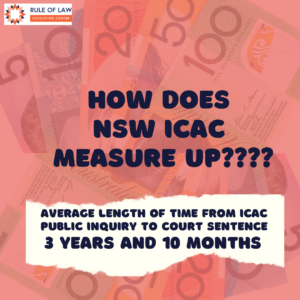Justice delayed: ICAC inquiries take too long
Chris Merritt 4 August 2022
Published in the Australian Newspaper

Next week, when Peter Hall is due to step down after five years at the helm of ICAC, he’ll leave an organisation that is struggling.
The Independent Commission Against Corruption is not meeting its performance indicators and that means Hall’s successor as chief commissioner, John Hatzistergos, has a challenge in front of him.
The commission aims to complete 80 per cent of preliminary investigations within 120 days. But its last annual report shows the proportion of preliminary investigations completed within 120 days declined from 87.5 per cent in 2019-20 to 62.5 per cent in 2020-21.
Once a matter moves up and becomes a formal “operation”, the commission aims to complete 80 per cent of these matters within 16 months. That target is also not being met. The percentage of operations completed within 16 months fell from 30 per cent in 2019-20 to 20 per cent in 2020-21.
The average time taken to complete a full investigation increased from 558 days in 2019-20 to 807 days in 2020-21.
The commission attributes this to special factors including the pandemic, but the result is the same: Hatzistergos is inheriting an organisation whose performance has deteriorated.
It would, however, be unfair to blame this all on Hall. Research by the Rule of Law institute shows a pattern of growing delays that predates his appointment as chief commissioner in 2017.
Click here to read the research. 
That research has found delays of up to seven years in securing convictions against wrongdoers who have been found corrupt by ICAC after public inquiries.
When measured from the first day of a public hearing by ICAC to the day on which wrongdoers are sentenced by a court, the average delay has almost doubled – up from two years and six months in 2012 to four years and nine months in 2017.
The average delay over that period was three years and 10 months but the research has also identified one person who is still waiting to be sentenced seven years after the start of a public hearing that resulted in a finding of corruption.
That seems to be the result of structural problems that are imposed on the justice system by the procedures ICAC is required to use.
This is best illustrated by considering the ludicrous delays that afflicted the prosecution of Eddie and Moses Obeid and their co-conspirator, Ian Macdonald. Their conviction is subject to appeal but the issue here is slow justice, not guilt or innocence.
In July last year, when Justice Elizabeth Fullerton handed down guilty verdicts, her judgment concerned events that took place up to 14 years in the past at the time the case was finalised. They had been brought to ICAC’s attention 10 years earlier.
The commission received a tip-off in February, 2011, conducted an inquiry known as Operation Jasper and finally produced a report almost two and a half years later – in July, 2013.
The greatest contributor to the delay seems to have been the task confronting the Office of the Director of Public Prosecutions once it received the material that had been assembled by ICAC.
The prosecutors did not produce their first indictment against the Obeids and Macdonald until July 13, 2017. That was four years after the Jasper report.
It was not until almost six years after the Jasper report that the DPP produced a final, amended version of that indictment on April 8, 2019.
But don’t blame the prosecutors. A more likely explanation is the inconsistency between the rules that govern procedures at ICAC and the requirements of the justice system.
ICAC is not bound by the rules of evidence and can coerce people to answer questions and produce documents. But section 37 of the ICAC Act means material produced under coercion cannot be used in subsequent proceedings.
So in order to prepare an admissible case, prosecutors had to go over much of the ground that had been covered by ICAC – while taking care to avoid tainting their case with material obtained through coercion.
The problem is structural. Successive parliaments have given insufficient attention to the fact that ICAC, while not a court, investigates matters that can end up in court.
Yet the ICAC Act does not require the commission to give priority to the requirements of justice – such as a prompt and fair trial.
There are lessons here in the way the Coroner Act deals with similar issues.
If a coroner forms the opinion that the evidence shows there is a reasonable prospect a jury would convict someone of an indictable offence, the coroner can suspend the inquiry.
The coroner is then required to give the DPP all depositions and provide the name of the person concerned and the particulars of the relevant offence.
The same logic should apply to ICAC: there is a public interest in conducting inquiries and uncovering facts. But there is a greater public interest in bringing serious wrongdoers to justice without delay.
This procedure in the Coroners Act, if injected into the ICAC Act, might produce swifter justice. It would also help if parliament required the commission to more closely align its procedures with those of the justice system by winding back the use of coercion.
Chris Merritt is vice-president of the Rule of Law Institute of Australia. This article is based on the institute’s submission to an inquiry into time standards at ICAC that is being conducted by the NSW parliament’s ICAC oversight committee.
